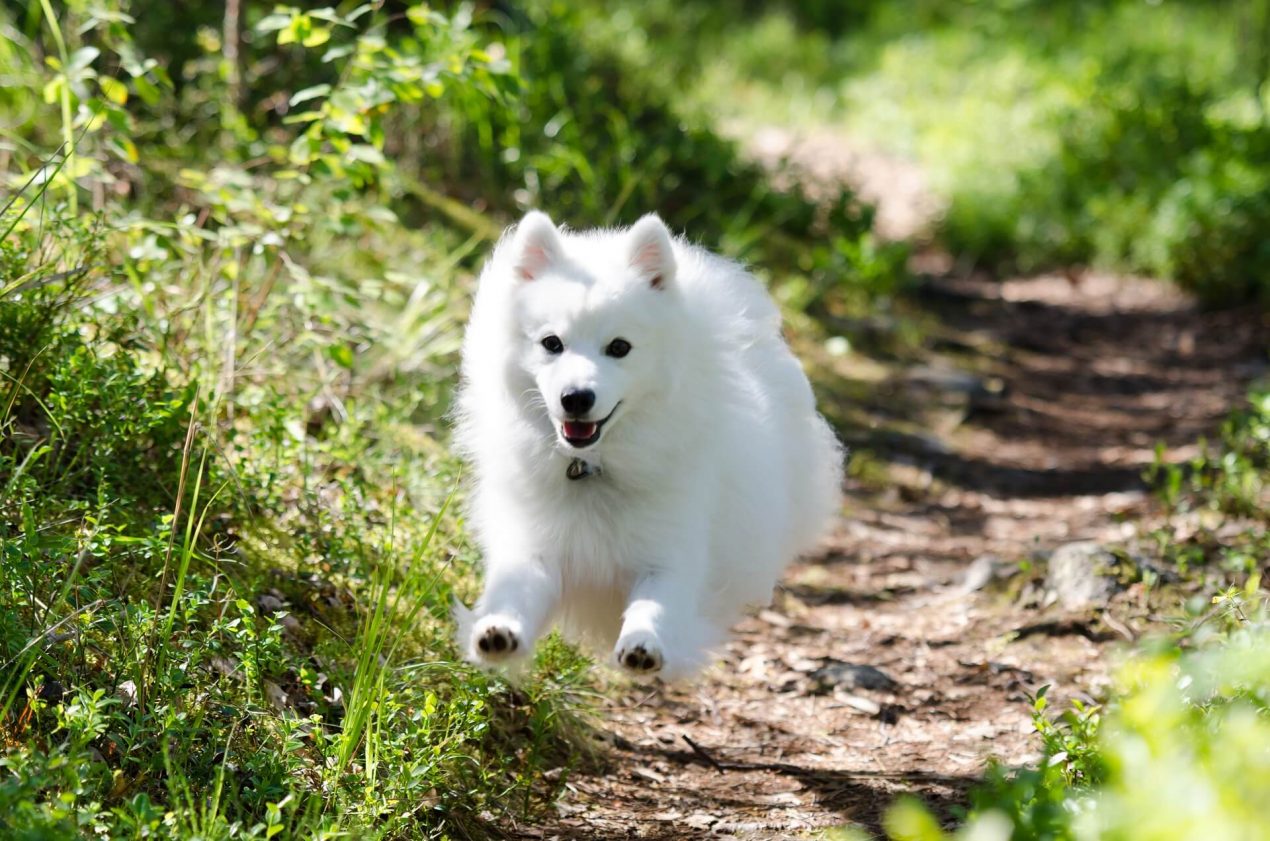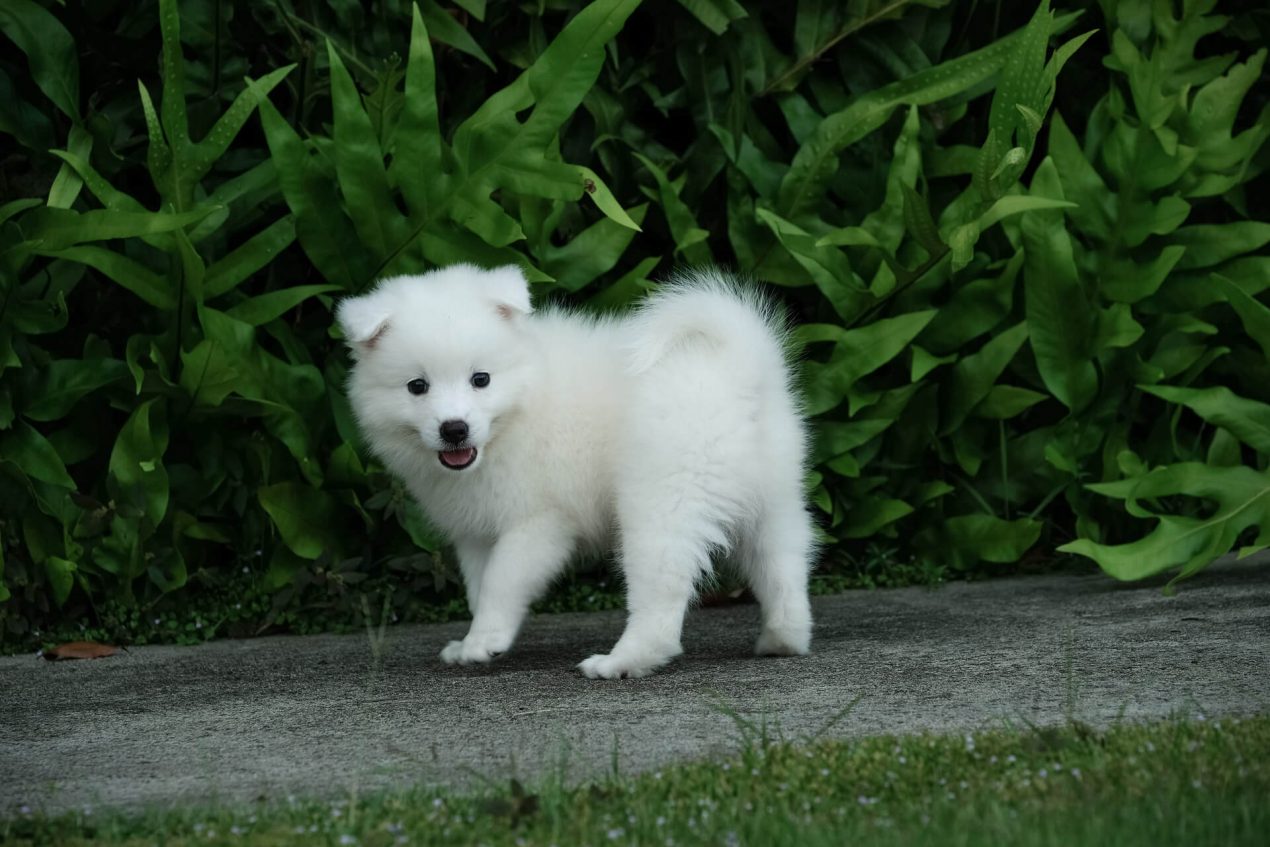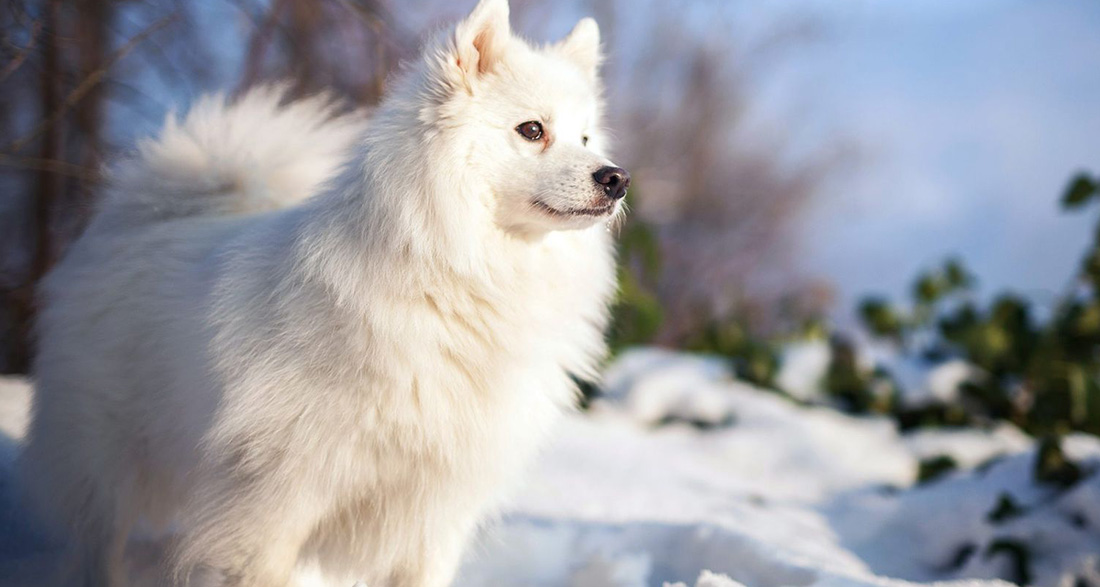The Japanese Spitz is much more than just a small white furball. In our profile, you’ll learn everything you need to know about the Nihon Supittsu, as it’s called in its homeland Japan.
History of the Japanese Spitz
The Japanese Spitz is a relatively young breed of dog. There are various theories about the history of the Japanese Spitz. The most likely theory is that around the year 1920, German Spitz dogs came to Japan with travelers and immigrants. It’s also possible that they traveled through Siberia, where they were crossed with Nordic Spitz breeds.
In 1921, a white Spitz was first presented at a dog show in Tokyo. These fluffy dogs soon became very popular among the people of Japan. Japanese breeders then began to establish their own breeding line using German Spitz dogs from American, Canadian, Chinese, and Australian breeding. They placed emphasis on a compact body structure and ensuring that the dogs’ hunting instinct was not as pronounced as in other Spitz breeds.
Their goal was to create a pure companion dog. In 1948, after World War II, the Japanese Kennel Club was founded for Spitz breeds, and the breed standard for the Japanese Spitz was established. International recognition by the FCI, the international breeders’ umbrella organization, followed in 1964.
Breed Overview
GROUP: Non-Sporting
HEIGHT: 10 to 25 pounds
WEIGHT: 12 to 15 inches tall at the shoulder
COAT: A straight and stand-off outer coat paired with a short, soft, dense undercoat
COAT COLOR: Pure white
LIFE SPAN: 12 to 14 years
TEMPERAMENT: Playful
HYPOALLERGENIC: No
ORIGIN: Japan
Character and Temperament
You shouldn’t underestimate the Japanese Spitz just because it’s relatively small. It’s a true powerhouse, sporty, cheerful, hardly ever tired, and playful. That’s why it’s an excellent family dog and a true buddy for children. It prefers to be where the action is and wants to be with its people. Being left alone is torture for it. It’s intelligent, also wants to be mentally challenged, and enjoys learning tricks.
The “will to please,” the desire to please its humans, is strong in this breed. It dutifully guards its people and its territory but is not a barker who immediately alerts; on the contrary, it’s expressly noted in the breed standard that it must not make noise. Of course, it may bark occasionally, but the Japanese Spitz is much quieter than its relatives, the Spitz breeds from Europe.
It’s curious, sometimes a bit suspicious of strangers, but neither fearful nor aggressive. If it sees its humans in serious danger, it bravely defends them. Its hunting instinct is virtually nonexistent, and it generally gets along well with other pets, seeing them simply as pack members. This can lead to problems with older animals that want peace and quiet when living with the spirited little Japanese Spitz. Otherwise, living with the Japanese Spitz is straightforward, and if they can handle its temperament, it’s also an ideal dog for beginners.
| Affection Level | High |
| Friendliness | High |
| Kid-Friendly | High |
| Pet-Friendly | High |
| Exercise Needs | Medium |
| Playfulness | High |
| Energy Level | Medium |
| Trainability | High |
| Intelligence | High |
| Tendency to Bark | Medium |
| Amount of Shedding | Medium |

Acquiring a Japanese Spitz
Japanese Spitz dogs are still relatively rare in Europe and the United States, although their recognition and popularity are increasing. If you want to add a Japanese Spitz to your family, be prepared for a wait and a longer journey, as there are still not many breeders for Japanese Spitz dogs. Nevertheless, you should only buy from a reputable breeder who prioritizes the welfare of the animal.
Alternatively, you can inquire at shelters or with animal welfare organizations such as “Spitz in Need.” Unfortunately, papers do not always prevent animals from ending up in shelters.
What should I consider when buying?
A good starting point for finding a trustworthy breeder is the websites of the Association of Dog Lovers (AKC) and the Japanese Spitz Club of America, to which the breeders of the Japanese Spitz are also affiliated. A reputable breeder will allow you to visit and get to know them and their breeding animals so you can see the conditions in which your puppy will live in its first weeks of life.
Are the dogs allowed to live with the family, and are they integrated? Do they seem healthy and happy? The first weeks in a dog’s life are crucial for socialization and later life. A good breeder will answer your questions and also ask you questions. After all, they want their puppies to go to good hands. Even if the wait may seem long, you should never succumb to the temptation to buy from a breeder where you cannot see the home of the parent animals and the puppy.
Unfortunately, it often happens that so-called “puppy mill” dogs are sold through classified ads. They are often cheaper, but usually, the papers are forged. These puppies usually come from so-called “producers” who keep the females in a kennel or only in a room and lead a sad existence as “breeding machines.” These puppies have had few positive experiences and are often already sick when sold.
A reputable breeder will need to charge between $1,500 and $2,000 for a puppy, but this is also because the puppies have already had their first examinations and vaccinations by a veterinarian. The parent animals are also regularly examined by a veterinarian.
Development and Training of the Puppy
Japanese Spitz dogs are intelligent and want to please their humans. They are generally easy to train, so even beginners get along well with them. Nevertheless, they go through their teenage years and try to test their limits. This is where loving consistency is required to train your little Japanese Spitz dogs. And it will certainly not always be easy when your little fluffball looks at you with big eyes. But the effort is worth it.

How to Care for a Japanese Spitz?
Japanese Spitz dogs feel comfortable anywhere. Of course, they will appreciate a house with a garden, but they can also live in an apartment in the city. Due to their size and calm nature, they are perfect for this. With them, you don’t have to worry about living in an apartment building and them erupting into loud barking and yapping every time a neighbor passes by your door.
More important to a Japanese Spitz than living conditions is being with its human, always and everywhere. If you live in a city apartment, however, you must ensure that you and your dog engage in plenty of activities together so that they can burn off energy.
Activities with the Japanese Spitz
The Japanese Spitz is open to anything that promises action, play, and fun. This can be long walks or jogging together, but also dog sports. Particularly popular with lively Japanese Spitz dogs are agility or dog dancing. However, they are also open to all other dog sports. The main thing is that they can spend time with you. They don’t want to hang around on the couch all the time, with or without their human.
Health and Grooming
Japanese Spitz dogs are generally robust animals that suffer little from diseases. However, like many small dog breeds, some individuals may suffer from patellar luxation, where the kneecap jumps out. Since this problem can also be hereditary, reputable breeders do not breed with dogs that have this issue. However, it is not a breed-specific disease. Occasionally, there may also be a blockage of the tear ducts. But generally, Japanese Spitz dogs lead healthy lives and can live to be 12 to 14 years old.
The plush coat of the Japanese Spitz requires adequate care. They need to be brushed at least once a week. During shedding season, you should brush them daily.
Interesting and Fun Facts
At the beginning of breeding, inbreeding often occurred because only a few dogs were available. The appearance and temperament were to be shaped in a certain direction. However, nowadays, breeders are very careful to avoid inbreeding and only breed with healthy animals. Therefore, you do not need to worry about hereditary diseases.
Do you also have a Japanese Spitz or are you planning to get one in the future? Tell us what makes the breed so special in the comments!


